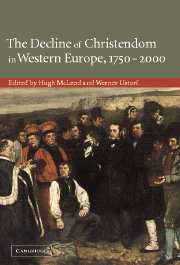Book contents
- Frontmatter
- Contents
- List of contributors
- Preface
- 1 Introduction
- Part I
- 2 The secularisation decade: what the 1960s have done to the study of religious history
- 3 Christendom in decline: the Swedish case
- 4 New Christianity, indifference and diffused spirituality
- Part II
- Part III
- Part IV
- Index of people and places
- Subject index
3 - Christendom in decline: the Swedish case
Published online by Cambridge University Press: 03 July 2009
- Frontmatter
- Contents
- List of contributors
- Preface
- 1 Introduction
- Part I
- 2 The secularisation decade: what the 1960s have done to the study of religious history
- 3 Christendom in decline: the Swedish case
- 4 New Christianity, indifference and diffused spirituality
- Part II
- Part III
- Part IV
- Index of people and places
- Subject index
Summary
Available data indicate that the share of the population who adhere to Christian beliefs or who devote themselves to such traditional religious activities as prayer and church attendance declined in Sweden during the twentieth century. The decline in church attendance can easily be documented. Information on religious beliefs is available only for comparatively recent times; hence, we may run the risk of overestimating the former prevalence of such beliefs. The same is true of information on prayer habits.
It should also be borne in mind that certain forms of religious practice that in the contemporary Swedish situation may be regarded as expressions of religious commitment, e.g. church attendance, formerly were part of a social and cultural pattern to which individuals were expected to conform. While nowadays the share of the population who attend public worship is considerably lower than the share who believe in God, the reverse may have been true in times when church attendance was the prevailing social norm.
Available data indicate a decline not only in the prevalence of religious beliefs, but also in the saliency of these beliefs. A smaller share of the population adhere to the Christian faith, and among those who still do hold on to this faith (or to certain parts of it) many seem to do so with a low degree of personal commitment.
- Type
- Chapter
- Information
- The Decline of Christendom in Western Europe, 1750–2000 , pp. 47 - 62Publisher: Cambridge University PressPrint publication year: 2003
- 9
- Cited by



